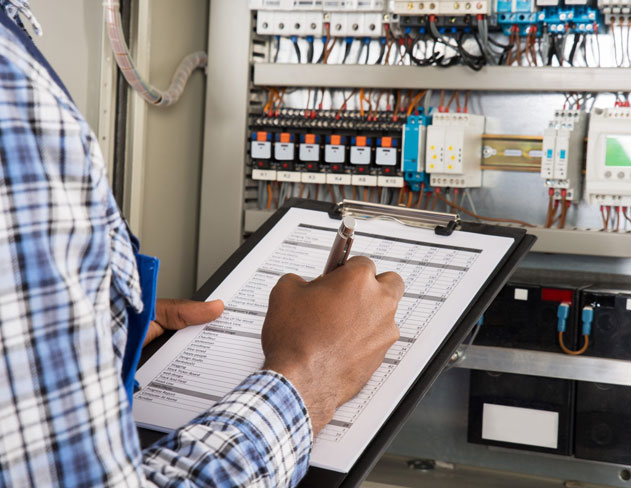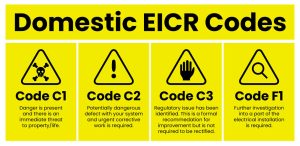As a landlord of one or more rental properties, you will have many responsibilities to keep your properties and your tenants safe, from property maintenance and housing law to gas and electrical safety, and most of these are now legal requirements.

In this guide we will answer all your questions relating to electrical safety, electrical safety certificates and your obligations as a landlord.
What is an EICR?
It is now a legal requirement to hold an Electrical Installation Condition Report (also known as fixed wire testing, periodic inspection report, Homebuyer’s Test, landlord safety test or Domestic EICR) to identify if there is any damaged wiring or faulty sockets and switches.
Luckily, arranging an EICR is quick and easy to do. At Hexo Electrical Testing we offer fast, expert testing and EICR certificates. One of our friendly team will be happy to help organise an electrical check for you – get in touch here.
Do I Have to Have an EICR?
Most landlords already do the right thing and check their rental property is safe for their tenants. It used to be simply advisory and an assumption that landlords made sure the electrical installations in their property were safe, and any existing legislation applied to commercial and other rental properties.
But in June 2020, a new law was implemented to improve safety in all residential premises and particularly in the private rental sector to ensure high-quality, safe and secure housing. The government introduced new regulations that require landlords to have electrical installations in their properties inspected and tested at least every 5 years, applying to new tenancies. In April 2021, this was updated to include all tenancies, new and existing.
It is essential that all landlords of residential properties have their electrical installations inspected regularly and provide electrical safety certificates to both their tenants and to local authorities when requested.
Why are EICRs Important?
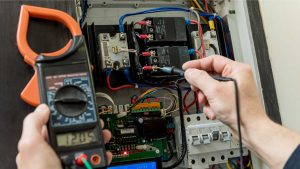
A recent report identified that electricity fires affect 20,000 homes in the UK each year, with electrical products causing 89% of the fires and 11% caused by faulty wiring. So you see why regular inspections and electrical safety certificates are now an important part of a landlord’s duties.
Which Rented Properties do the Electrical Safety Regulations Apply to?
The regulations apply to residential properties where a private tenant has a right to occupy a property as their only or main residence and pay rent. This includes flats, terraced houses, semi-detached and detached houses as well as Houses in Multiple Occupation (HMOs).
Exceptions include social housing, lodgers, those on a lease of seven years or more, student halls of residence, hostels and refuges, care homes, hospitals and hospices, and other accommodation relating to healthcare provisions.
How Much does an Electrical Safety Certificate for Landlords Cost?
The cost of an electrical safety certificate varies depending on factors such as the size of your property and the quantity of electrical circuits. Larger properties with more circuits tend to take longer to test meaning the price will be more than smaller properties with fewer circuits.
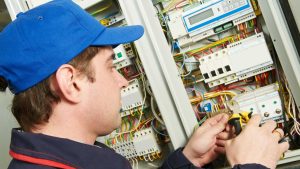
Hexo Electrical Testing provides standardised pricing and rates for all our services, so you know the full cost of our service at the time of booking, giving you peace of mind and safeguarding your budget. Visit our pricing page for more information.
What Gets Checked in an EICR Inspection?
Your fully qualified and registered electrical inspector will need to turn the electricity off at your rental property to carry out the testing safely.
Before carrying out visual checks, they will test the wiring, circuit accessories and switchgear of the property by running electrical currents through the circuits to check they are working safely. The purpose of this is to detect any potential fire hazards or electric shock risks, defective electrical work, lack or earthing and any overloading of circuits or equipment that could adversely affect your property and your tenants.
If any defects are found, your inspector will provide a coded observation for each and these will be shown on your EICR certificate.
Hexo inspectors are very experienced and will give an in-depth inspection of your rental property using the latest electrical testing equipment and accessories. We can also offer PAT and FAT testing if required.
What do Landlords Need to Know to Prepare Rental Properties for an Electrical Inspection
Before a test, remind yourself where the relevant installations are, such as wiring, socket outlets, light fittings, fuse box and permanent equipment such as showers and extractors. White goods and other appliances are not included in the testing and are the responsibility of the tenants, though you can consider getting these tested under a PAT or FAT testing scheme, giving you and your tenants extra peace of mind.
What Happens if You Fail an Electrical Inspection?
Where remedial work is required, the following classification codes will be shown on your EICR:
- Code 1 (C1): Danger present. Risk of injury. Immediate remedial action required. These installations must be made safe immediately.
- Code 2 (C2): Potentially dangerous. Urgent remedial action required. These installations must be made safe as soon as possible.
- Further Investigation (FI): Further investigation required without delay. The electrical inspector will need to return to investigate the issue further
- Code 3 (C3): Improvement recommended. You do not need to get this fixed immediately.
A code C1, C2 or F1 will mean your EICR inspection will be marked as unsatisfactory. You will need to carry out remedial work to get any issues investigated and repaired.
Here at Hexo Electrical Testing, one of our experts will also provide a quotation to repair the defects and give advice on your options regarding the repair.
How Long Do You Have to Remedy Faults From an Electrical Inspection?
For the most severe observation code, C1, immediate action to rectify the defect is mandatory and we are obliged to rectify the level of the defect from a C1 to at least a C2 during the inspection visit. You will have 28 days to rectify a code C2 or FI. Code C3 does not have legal time limits.
When the work is completed, you will be provided with written confirmation from the engineer that carried out the remedial work. A retest and new EICR is not necessary following these works as the written confirmation will turn the unsatisfactory result into a satisfactory one.
How Long is an EICR Valid For?
The electrical safety certificate lasts for five years before a new EICR inspection needs to be undertaken, unless a change of tenancy occurs within those five years. For older electrical installations, more frequent testing can be required.
What are Your Tenants’ Rights When it Comes to Electrical Safety?
An electrical safety inspection must be carried out before a tenancy starts and at least every five years during the tenancy.
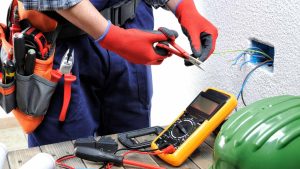
Your tenant and the local authority will need to be provided with written confirmation if any remedial work has been carried out within 28 days of completing the work.
What Can I Do If My Tenant Won’t Allow Access to the Property for an Electrical Inspection?
On occasion, a tenant may refuse access to the property for various reasons. As a landlord, you will need to show you have taken reasonable steps to explain to the tenant why access is important and keep copies of any communication to and from them to prove you are not in breach of your duty to comply with any remedial notice. It is also important to keep copies of any communication with the electricians to confirm that you have tried to complete the work required.
What Happens if a Landlord Doesn’t Have an EICR?
Failure to provide the required safety certificates can lead to prosecution. Any landlord found to be in breach of the regulations may be subject to a fine of up to £30,000 by the local authority.

Quite often, your property insurance may also require evidence of a full EICR in the event of a claim. Check with your insurer to see if this is the case.
It’s Always Worth Being Safe and Fully Compliant With Any Electrics in Your Rental Property
If you don’t already have an EICR for your rental property, the good news is that it is super easy to arrange for an inspection and test. Speak to one of our friendly team at Hexo Electrical Testing to get a fast and accurate quote today.
Don’t underestimate the value of having your electrics checked over by the experts, and staying safe in the knowledge that they’re compliant and meet all regulatory requirements. Not only will you be fulfilling your duty as a responsible landlord, but you will also be protecting your investments by keeping both your property and your tenants safe.

